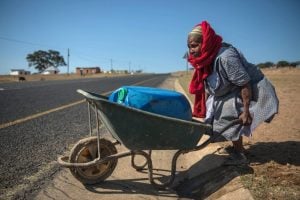Incorrect claim resurfaces that SA is one of world’s ‘30 driest countries’
This article is more than 7 years old
 A resident of Nongoma, north west of Durban and which has been badly affected by drought, prepares to collect water from a free water point sponsored by concerned citizens in November 2015. Photo: AFP/MUJAHID SAFODIEN
A resident of Nongoma, north west of Durban and which has been badly affected by drought, prepares to collect water from a free water point sponsored by concerned citizens in November 2015. Photo: AFP/MUJAHID SAFODIENIn an article on “managing and conserving water more efficiently in South Africa”, online financial news publication Moneyweb, repeated the claim that South Africa is “one of the 30 driest countries in the world”.
Both the South African government and media have been reporting this statistic since as far back as 2004.
However, as we reported earlier this year, the ranking is incorrect. The most recent data from the United Nations Food and Agricultural Organisation’s Aquastat database, shows that South Africa ranked as the 39th driest country out of 182 countries, with a long-term average rainfall of 495 mm recorded in 2014.
It is important to keep in mind that average rainfall is neither the only, nor the best measure, of water scarcity. An expert told Africa Check that, rankings aside, “South Africa does have significant regions of high water stress, and is very vulnerable to water risks”. - 16/11/2016
Additional reading
Is South Africa one of the 30 driest countries on earth?
Frequently asked questions about South Africa’s drought
Zambia doesn’t hold 60% of southern Africa’s freshwater, but 4.5%

Add new comment